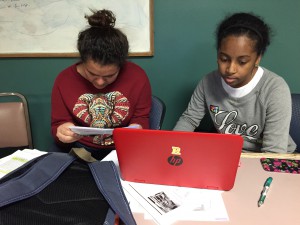WRT-105 is a required course for all Rochester students to take during one of their first two semesters. I know calling it “required” makes it seem like a boring class but I promise it is a great resource.
When it came time for freshmen to register for classes, everyone was scrambling to get into a WRT-105 class first semester. I wanted to take WRT-105 first semester, too, because I knew I would want some advice about how to write papers at college. I was lucky enough to find one open spot in “Ethics of Science Fiction” with Professor James Otis. There is a wide variety of topics for WRT-105. For example, “Disease and Society” and “How Should a Person Be?” were also offered this semester and “Money and Morals” will be offered next semester. There is bound to be a course that piques your interest.
My professor explained the mindset behind WRT-105. Broadly put, it is designed to give students the skills to thrive in any discipline they choose. You will be able to draw upon what you learn in WRT-105 whether you plan to study physics, English, economics, etc. On the other hand, the individual courses delve into specific topics with the intent of covering the various interests of students. That way, students can choose an intriguing topic, making this requirement a class they want to take.
WRT-105 courses are capped at about 15 students, which is why it is competitive to get into one sometimes. On the plus side, this smaller class size makes it an inclusive environment. I felt encouraged to participate more in my writing class compared to my larger classes. It also helped me to meet new friends. Sometimes in bigger classes, the lecture is straightforward and leaves little time for socializing. On the other hand, we often work in groups or with partners in WRT-105. Aside from knowing all your classmates in WRT 105, your professor is more engaged with the class.
So this is my perception of the freshman year writing requirement. WRT-105 is designed to improve your academic writing skills. Students write four formal assignments, on various yet related topics. There is always an opportunity to improve, because we turn in drafts before the final paper is due. That way, you can really take the time to analyze your own writing and get some second, third, and maybe even fourth opinions. It was especially helpful to have my professor read through my drafts so I had a clear sense of how well I was following the rubric. Peer reviewing with other students introduced me to new ways to organize my essays. Furthermore, one resource commonly introduced in WRT-105 is the “They Say, I Say: The Moves that Matter in Academic Writing,” which lists strategies for efficient argumentative writing.

I personally benefitted the most from learning about ways to edit my drafts. I could look out for the patterns I tended to use. This course helped me recognize my own strengths and weaknesses in my writing. I felt more involved and invested in my learning. I genuinely enjoyed this course. I found it interesting because the ethics topics we discussed fit in well with my other public health courses. However, it was equally interesting to see the various opinions of my peers from different academic disciplines about these ethical debates. I would recommend “Ethics of Science Fiction” to any incoming freshman!
Overall, WRT-105 is a fun, easy-going, and valuable class. What you learn here will apply to the rest of your time at Rochester, and in your professional life, as well!

